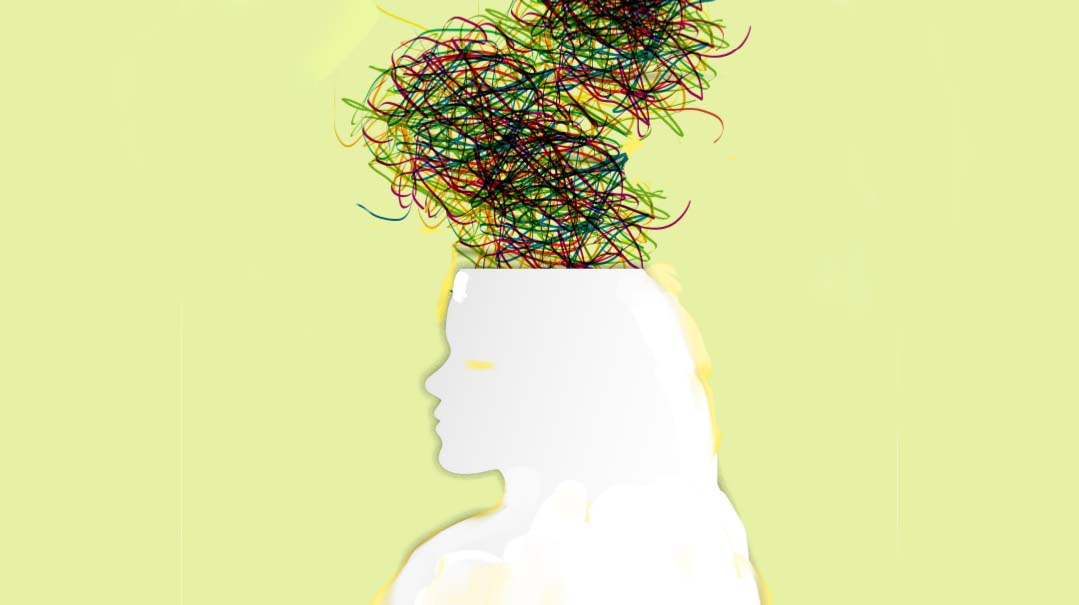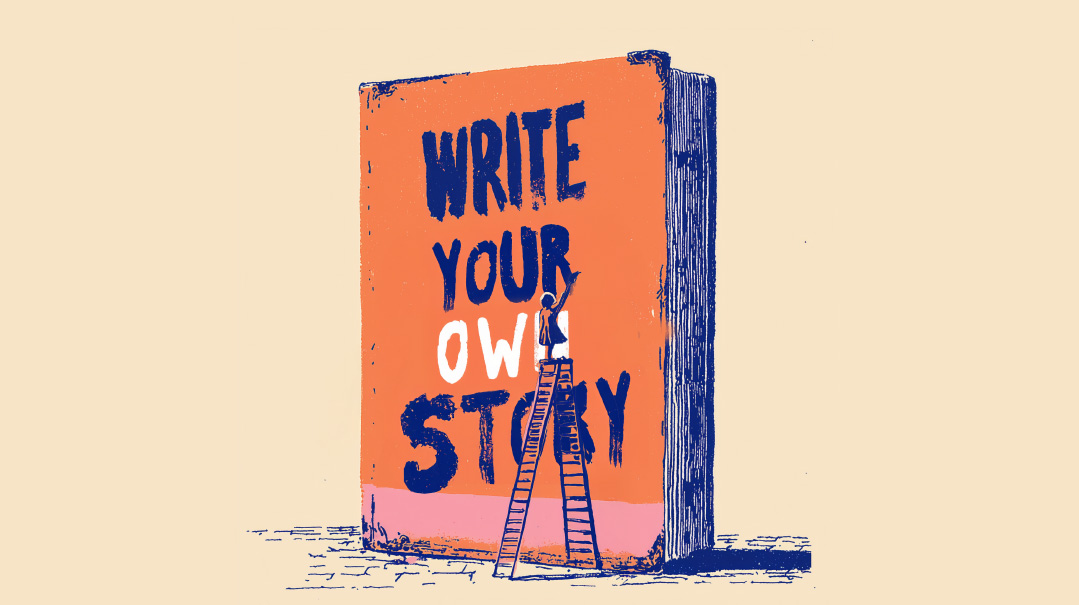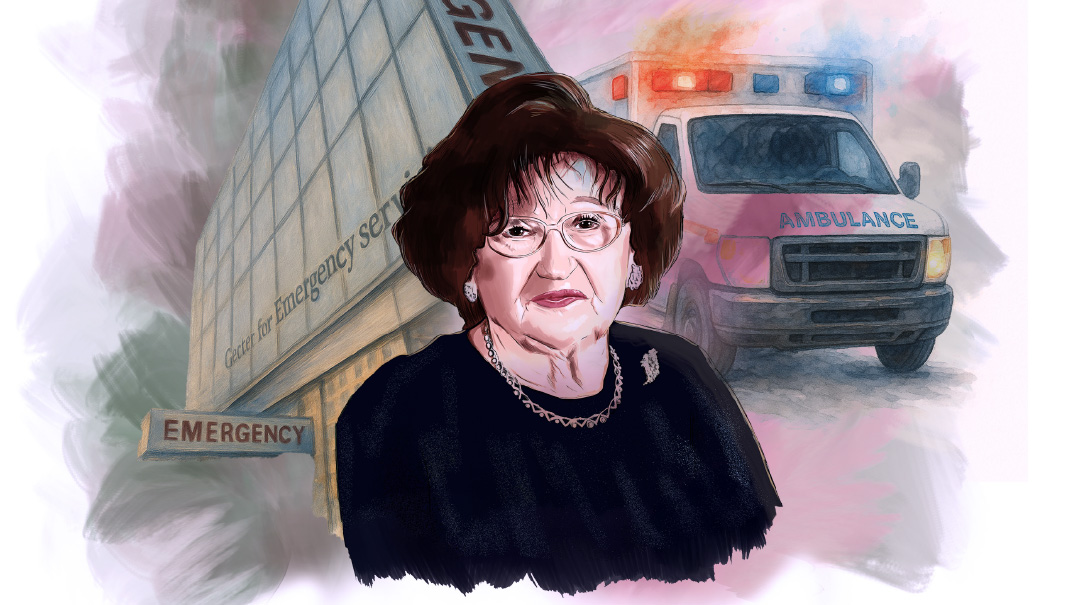Just Me or ADHD?
| October 26, 2021If managing life feels impossible, you may have adult ADHD — and there’s a lot you can do about it

Sometimes opposites really do attract: Shaya and Esti* are a definite example of the phenomenon. Shaya pays the bills, coordinates which sibling is going to the parents for which days of Yom Tov, and he’s also the gabbai of the shul.
Esti is the life of the party, spunky, creative and spontaneous, with a great sense of humor. Esti is famous for being everyone’s best friend. Running a home — not so much. She doesn’t seem to have a great handle on the basics. She’s technically a great cook, but forgets the food in the oven a bit too often, can’t ever find her keys (she has the Tile key finder app but never remembered to program it), is always running late to events, and she’s behind on the laundry. Very.
Shaya’s frustrated. Esti’s overwhelmed trying to juggle all the balls and feeling like she can’t keep up with life. She’s often up well past midnight finishing the laundry, trying to clean the kitchen (again), figuring out which kid needs to see the dentist and when, and making a new shopping list to replace the old one that disappeared from the counter. Watching her friends manage their (spotless) homes doesn’t do much for her sense of self. She’s tired and gets snappy way too fast for her liking. She’s trying harder and harder, but trying doesn’t seem to help much.
For the longest time, Esti didn’t have much hope that things would improve. She made minor improvements over the years, mostly by figuring out ways to compensate for her disorganization. She bought the biggest kitchen clock she could find to help her keep track of time. A second timer on the counter helps her remember the chicken in the oven. But nothing made a meaningful difference — she knew she’d need a miracle for that to happen.
The miracle happened when Esti’s fifth-grade son started Gemara and couldn’t keep up. His rebbi suggested going for an evaluation to see whether he had ADHD (attention deficit hyperactivity disorder). When she finally sat down and filled out the evaluation forms sent by the therapist, Esti was shocked to discover how many of the questions were highly applicable to her own life. Soon it clicked: Esti’s oldest joke, “it’s my ADHD,” was actually no joke.
Getting formally diagnosed and taking steps to address her ADHD was a game changer for Esti. She finally understood why she acted as she did and what was behind the chaos of her daily life. More than anything, she was incredibly relieved to discover that it really wasn’t a lack of trying, rather a biological inability to do the things she wanted. Just realizing and understanding what was underlying her actions put her in a better emotional space and allowed for real change to begin. It wasn’t a fairytale ending — and it’s not over yet — but Esti’s life is finally moving in the right direction.
Hidden in Plain Sight
Esti’s story is surprisingly common. Studies estimate that 4.4 percent of American adults have ADHD, representing about 8 million people (National Institute of Mental Health). This is widely believed to be a low estimate. Of those, only 10 percent have been diagnosed, a fraction of whom have been treated (National Comorbidity Study).
ADHD goes unrecognized in adults mostly because we think of ADHD as something belonging to the hyperactive kids in classrooms. There are actually three different types of ADHD: hyperactive-impulsive, inattentive, or combined (when both are present). Adults tend not to present with the hyperactive component and therefore often don’t consider the possibility that they have it.
Women are even less likely to realize they have it because ADHD was generally thought to mostly affect men, and the social and behavioral symptoms are less apparent in women. When they are apparent, they’re often explained away with terms like disorganized, forgetful, or spaced out.
Having ADHD and not knowing it can make life very difficult. ADHD often impairs executive functions, which are the skills needed to plan, focus, remember, and multi-task. If you’re an ADHD mother trying to raise a family and manage a house, difficulty with executive function can easily bring on feelings of failure, hopelessness, and overwhelm. As a result, many related disorders can crop up, such as depression, anxiety, addictions, poor workplace performance, and failed relationships. A recent study found that marriages where one or both spouses have untreated ADHD are twice as likely to end in divorce. Adults with ADHD are more likely by two thirds to have been fired from their job and three times more likely to have quit impulsively (Barkley and Gordon, 2002).
One outgrowth of this common lack of awareness is how people view themselves. Adults with ADHD find it close to impossible to get complex projects or tasks off the ground. An adult with ADHD will push off making her Yom Tov menu until just about Erev Yom Tov (on a good year). She’ll file extension after extension to avoid getting the paperwork for her tax returns together. She’ll almost never schedule a well visit with her doctor. Sensing the frustration of her spouse, boss, and kids, and constantly battling distractions in her personal life, it’s easy to see how her self-esteem can be shot.
It’s important to realize that these failures are not for lack of trying. She’s fully aware of what has to happen — but she just can’t get it done. If you ask her why she’s like this she’ll probably say she’s lazy, she’s unmotivated, or she’s just not capable. You might believe it, and she certainly believes it — especially if that’s what she’s been told all her life. “If you would just try harder….” is a refrain adults with ADHD have heard (and told themselves) again and again and again. But try they have, with minimal progress, if any.
What they don’t know is that there’s a big difference between being lazy, unmotivated, and incapable, and having a brain that’s wired differently from those around you. In fact, neurodivergent people often overcompensate and are using a lot more energy to appear on top of everything than their neurotypical family and coworkers. Understanding how your brain functions and why those differences can cause struggles is the key to rebuilding self-image and figuring out how to manage life more effectively. Once you’re in this new space, you can start to take action to live your life as you want it to be.
Aren’t We All ADHD?
The short answer is, no. Esti’s joke was an unintentional truth, but not everyone is “a little ADHD.” However, life hits hard these days, and our modern lifestyle can mimic or trigger a lot of struggles and sentiments commonly found in people who are neurodivergent. The fast-paced nature of life in 2021 can be overwhelming. Jobs are demanding and raising children is challenging… on a regular day. Throw in Yamim Tovim, summer vacation and global pandemics, and you can see why everyone gets stressed and overwhelmed.
Competing demands on our time can lead to a general feeling of lurching from task to task, never quite finishing anything, and swimming through an endless pool of to-dos. Social media — and all media for that matter — provides an endless source of distraction, entertainment, and sometimes mind-numbing but fascinating information; and it all comes in 15-second bits because we can no longer focus much longer than that.
A world like this can make it difficult for adults to realize they might have ADHD. It also explains why there’s a dramatic increase in cases of ADHD being diagnosed. The slower paced life of the past allowed neurodivergent adults to get by without too many obvious impairments. The complexities and nonstop stimuli and demands on our attention today leave them struggling to cope.
Additionally, we’ve been conditioned to think of ADHD as a childhood condition — it brings to mind hyperactive and fidgety kids, who eventually grow out of their high energy or learn to control it in public. And yet, recent research has shown that roughly 90 percent of children with ADHD will continue to experience symptoms into adulthood, although the condition tends to become less apparent as they learn to manage their symptoms, and thus their level of impairment can fluctuate (American Journal of Psychology, 2021). Hyperactivity isn’t a significant feature when it comes to many adults with ADHD — either because they now manage hyperactivity without treatment or they have different symptoms — so it tends to be overlooked as a possible explanation for adult-life challenges.
Sometimes, other conditions such as anxiety, trauma, or even lack of sleep can mimic the symptoms of ADHD and lead to a misdiagnosis. Normal life circumstances such as the Yom Tov season in large frum families with busy lives can feel very much like it must be ADHD. When a parent is moving rapidly from task to task while getting interrupted dozens of times and never finishing projects, it can feel like he or she must have ADHD, but it may just be hectic life circumstances. In all cases, a proper and thorough evaluation by a licensed provider is a critical starting point to ensure an accurate diagnosis and successful outcome.
What it Really Looks Like
“You can focus when you’re interested” is one of the primary “gotchas” for adults who question whether they have ADHD. How can you have ADHD if you can focus intensely when you want to? In fact, this is why Esti never considered that she could actually be ADHD for so many years: She seemed to be able to focus perfectly when she was reading a good book or involved in a deep schmooze at the park… just not when she was trying to stick with a more tedious task like doing laundry.
Adults with ADHD don’t have a problem with focus: They have difficulty regulating control and prioritizing what to do when. If something is new or interesting, they can focus easily. They can even become hyper-focused, to the point where you’ll have trouble breaking their attention no matter how loud you get (think of what kids are like when they’re engrossed in a good novel). Therefore, they’ll find themselves constantly doing the most interesting task on their list well before the most important.
When it comes to social conversations, the same dynamic plays out. If the conversation is about a topic they find exciting, it will go well; if the topic is less interesting, their mind will wander. You’ll likely sense that the person you’re talking to isn’t really with you and get frustrated or feel she just isn’t interested in what you have to say.
This difficulty with controlling attention also explains why it can be so hard to start projects or tasks. To start something new, you have to get engaged with the task. Think of it like turning on the engine in your car before you can drive. Adults with ADHD experience tremendous difficulty getting engaged with things that are complex, tedious, or mentally tasking. Fun, new projects will always win out over more important, boring ones. Esti spends hours on the phone brainstorming and planning her son’s yeshivah Chinese auction without a problem. Planning Shabbos waits until Friday afternoon.
Adults with ADHD can get started on a task if it’s challenging, competitive, urgent, exciting, or all of the above. The good news is that once things are rolling, they can be an unstoppable force and highly successful. Don’t be surprised if the top raisers in a tzedakah campaign are adults with ADHD.
Still, getting engaged with a task is only half the solution. It may be exciting to start a project, but as it drags on, the ability to remain engaged wanes and the next exciting task can easily put an end to this one. Hence the many half-finished projects around their homes.
Another common area of deficit is in short-term memory, also known as working memory. Adults with ADHD can go to the store to buy something only to forget what they wanted, or they might lose their keys. They have difficulty staying on task and organized. Think of working memory as the big whiteboard of your brain: It’s used to write down all the information we need in the near future (plans for the day, things we need to buy, people we need to call, etc.). When the board fills up, new items automatically erase the old ones, and we have a hard time remembering them.
Imagine having a very small whiteboard, and you can understand what working memory can be like in some brains with ADHD. If you put down your phone and write its location on your handy whiteboard, but that gets overwritten when you remind yourself that you need to call the plumber, you’ll forget where your phone is. Once you make it to the kitchen, you’ll probably manage to take out the garbage (another task on the board), but there’s not a great chance you’ll remember to put in a new bag by the time you get back inside.
The combination of difficulty staying engaged with tasks and a working memory deficit presents a huge challenge in the work environment. Tasks are forgotten or dropped, projects are shelved halfway, reports never get done, and desks pile up with papers that will never be looked at; the manager is angry, coworkers are resentful. But the core issue is not a lack of motivation or trying — it’s an inability to prioritize what should be worked on, to get started, stay engaged, and remember what’s supposed to be accomplished.
Adults with ADHD often struggle mightily with timeliness. Dr. Ari Tuckman, a psychologist and noted expert on ADHD refers to this as being “time blind.” Neurotypical adults develop an innate awareness of the passage of time; they can feel when the magazine they’re reading is taking too long or when the food in the oven has been there long enough. Adults who are time blind will have a hard time sensing how much time something should take or is taking.
This makes planning something — and multitasking — difficult, as they’ll misjudge how long a task can take. They might allot a task a few minutes when it really requires far more time, or they can spend a whole day mentally preparing to go to an afternoon appointment. When they’re engaged in a conversation, book, or spreadsheet, they may suddenly realize they’ve been engrossed for hours even though it felt like a few minutes to them.
When it comes to marriage and relationships, a nuanced picture emerges. The exciting, spontaneous, fun nature of many adults with ADHD can be very appealing and keep life from getting boring. There’s always something new and out of the box happening. That said, many of the core ADHD symptoms can get in the way of a satisfying, stable relationship. Adults with ADHD can be well-meaning, but overpromise and not deliver, drop commitments, and appear uninterested or unwilling to change. It’s not that they don’t want to get it done, it’s that they can’t. Even if it’s really important to their spouse.
Esti really wants to have a neat house and supper ready when Shaya comes home, it just never quite seems to happen. She’ll start cleaning but get distracted by her phone pinging and go from distraction to distraction until she’s frantically scrambling minutes before Shaya walks in. She tries to explain to Shaya that she really is working hard but just keeps failing. Shaya can’t understand why Esti doesn’t get it done if it’s so important to him and concludes she just doesn’t care enough.
Discussions about the issue tend to go south fast because Esti gets defensive when she feels even slightly attacked. This is not uncommon to adults with ADHD who often report that they struggle with relationships because they take comments and feedback very personally.
Dr. William Dodson, a leading psychiatrist who specializes in adult ADHD, coined the term Rejection Sensitivity Dysphoria — an extreme emotional sensitivity brought on by feeling rejected or criticized by people important to you. The smallest comment perceived as negative leads to an almost unbearable feeling of rejection. The defensive reaction that’s triggered can be intense, and conversations that started off with well-meaning constructive feedback can deteriorate into a full-blown argument very rapidly. Sometimes, a persistent pattern of incidents of rejection sensitivity can lead to sadness and depression.
Is It All Bad?
Not at all! The flip side of ADHD is an amazing set of strengths that can lead to real success, when properly channeled. It’s no secret that many business leaders and innovators have ADHD and use it to their advantage.
Adults with ADHD can often be like the Energizer bunny and just keep going when everyone else has long given up. They’re often creative, out-of-the-box thinkers who can solve problems with new ideas no one else thought of. Interestingly, the ability to hyper-focus can be a positive as well — when a project needs to be relentlessly driven to a conclusion requiring focus for hours on end. Similarly, the difficulty with staying on task can be a surprising plus when you need someone who can be in several places at once, working on many different tasks simultaneously.
Adults with ADHD can be highly successful in business and community life because the need for dopamine leads to a willingness to take risks to fuel growth. They’re passionate and highly driven and will persevere when others have long given up. When it seems impossible that their shul will be able to build that new building, they’ll find a way to raise the money and make it happen. If a shift in approach is needed at work, their innate spontaneity allows for a rapid change of course where others may stay stuck and unable to change.
Heightened emotional sensitivity can also lead to greater ability to be empathetic and understanding with employees, coworkers, and friends. A great sense of humor and non-stop action can help a leader with ADHD develop a fun and engaging work environment resulting in increased worker satisfaction and higher levels of productivity.
There are many highly successful adults with ADHD who live their lives well without any intervention. Their symptoms haven’t disappeared, but they’ve likely figured out ways to effectively manage them. Outsourcing executive function tasks to an assistant, task management apps, and a life spent developing workarounds and hacks to address the symptoms will work for some. Others needs more help.
Working Toward Success
There are multiple layers of treatment that can be game-changing in their ability to address symptoms of adult ADHD. A comprehensive plan that deploys multiple strategies will have the best chance of success.
Medication is considered to be the first-line intervention. ADHD medications have been on the market for over 75 years and proven remarkably safe with minimal side effects. Researchers believe that ADHD results, in part, from a deficiency of chemicals in the brain. Specifically, ADHD brains have been shown to have low levels of the neurotransmitters norepinephrine and dopamine. Dopamine helps control the reward and pleasure center of the brain. This deficiency affects the areas of the brain that control executive function and organization, emotional regulation, and impulsivity. These areas are called the frontal cortex, the limbic system, and the basal ganglia. Stimulant medications, the first line of treatment, address this deficiency.
Many adults with untreated ADHD self-medicate with coffee — pots of it! It can help somewhat because coffee is a natural stimulant that enables your brain to better focus and maintain concentration, as well as increasing your energy levels.
There are two classes of medications which work in slightly different ways. Stimulants such as Ritalin or Concerta are the most prescribed, and they work rapidly and can be given in short or long-acting versions. Non-stimulants such as Intuniv or Strattera are often prescribed if the stimulants aren’t providing enough benefit or if there are unwanted side effects. Psychiatrists or Psychiatric Nurse Practitioners with extensive experience treating ADHD can work through the options and get to an effective working dose. At times, it can take a few weeks for a prescriber to find the right medication at the right dosage with the least side effects — but it’s well worth the effort.
Combining medication with therapy is thought to be the most effective treatment for ADHD. CBT (Cognitive Behavioral Therapy) won’t treat the core symptoms, but will help address the resultant life impairments, such as poor time management and procrastination. CBT helps patients address their negative patterns of thinking and reframe how they feel about themselves and their symptoms.
A couples therapist experienced in treating ADHD can help in working through the areas where the relationship is shaken as an outcome of the symptoms and the meaning ascribed to them by the non-ADHD spouse. Psychoeducation on ADHD is a critical component of treatment both for the adult with ADHD and for his / her spouse.
In Esti’s case, helping Shaya to understand why Esti acts the way she does will allow him to reframe the meaning of her actions in the moment. Instead of taking it personally and feeling disrespected, he can shift to understanding and possibly even to helping her cope with the symptoms. For Esti, understanding how her brain functions can help remove much of the guilt and shame that comes along with feelings of hopelessness and failure.
Lifestyle changes can help reduce symptoms as well. Improving sleep quality, a healthy diet, and consistent exercise, along with supportive and understanding social relationships are a great place to start moving toward an ADHD friendly lifestyle (Nadeu, 2002). Choosing a job that plays to your strengths instead of your weaknesses can make an enormous difference. A career that’s fast moving, stimulating, and exciting will work well for an adult with ADHD. Nursing, teaching, arts, and helping fields can be a great match.
Another layer of treatment is ADHD coaching. ADHD coaches don’t provide therapy, but can help in dealing with time and task management, strategic planning, and making smart, conscious decisions. Coaches tend to be more directive and are focused on goal-oriented strategies to help improve functioning. The field of coaching is less regulated so it’s important to do research and inquire about a coach’s training, experience, and certification.
Self-help tools can be useful and effective in addressing executive functioning deficits. Reminder apps, planners, key finders, and helpful friends / spouses are just some of the many tools out there. Accepting your last-minute nature and anticipating it can reduce anxiety about getting things done and free up emotional headspace. For business owners or managers, outsourcing tasks requiring executive function skills to an assistant allows you to focus on the things you’re good at while letting go of the things you’re not.
Noticing the life hacks that work for you and keeping them going will make life smoother. Living with adult ADHD can be awesome, tough, or both at the same time. Understanding what’s going on — and what you can do about it — is the first step to living your best life.
*Shaya and Esti are a composite sketch of a typical couple and do not represent real people
IS IT ADULT ADHD?
Wondering if you may have adult ADHD? The questions below can offer some clues:
- For your entire life, do you often daydream or not seem to listen when people speak to you directly?
- Have you had a lifelong difficulty concentrating on tasks you find boring or uninteresting?
- Have you always found yourself having difficulty getting started or initiating tasks or projects, even if they were very important?
- For your entire life, have you consistently had difficulty finishing projects you’ve started? (Do you have a lot of half-finished projects around the home or office?)
- For your entire life have you had a tendency to act or speak without thinking, for which you had almost immediate deep regret?
- Have you always been described as “high energy” or “always on the go”?
- For your entire life have you consistently had trouble “turning off your mind” so you could fall asleep?
- Do you “hyper-focus”? That is, do you have periods of activity during which you are so engrossed or involved in what you are doing that you are not distractible by people or events around you and lose track of the passage of time?
- Have you always been very sensitive (significantly more sensitive than other people you know) to rejection, teasing, criticism, or your own perception that you have failed or fallen short?
- Have you always had a tendency to lose things necessary to accomplish your daily activities? (For example, do you spend time almost every day searching for keys, tools, checkbook, etc.?)
Please Note: This questionnaire is not a diagnostic tool and should not be relied upon as such. These questions help indicate whether you have some of the common symptoms that may be a sign of adult ADHD but should never replace a proper evaluation by a licensed clinician. If you answered yes to a significant number of questions, consider a full evaluation from a licensed professional.
Reprinted with permission from Dr. William Dodson.
Dovid Becker, LCSW, ADHD-CCSP specializes in helping individuals and families with ADHD. He is a Program Coordinator and Professor at the Wurzweiler School of Social Work and is the Director of Camps Yachad and Neranina in Lakewood.
(Originally featured in Family First, Issue 765)
Oops! We could not locate your form.







